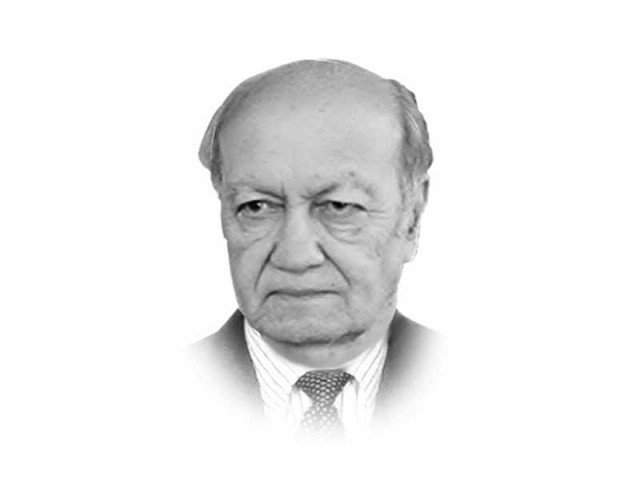Military operation in North Waziristan — an overview
Govt is mostly responding reactively to TTP’s very subtle propaganda rather than projecting a strong narrative.

The writer is a retired lieutenant general of the Pakistan Army and a former federal secretary. He has also served as chairman of the Pakistan Ordnance Factories Board
From the filtered news emanating from Waziristan, it appears that our troops after having systematically sanitised and encircled the cities Miranshah and Mirali have got things well under control and according to plan. It will be the military’s aim to separate the militants from the population both physically and psychologically.
There was justifiable criticism of the federal government for its poor management of evacuation of the civilian population. The administration showed gross indifference in handling the internally displaced persons (IDPs). Majority of the families faced enormous difficulties due to shortage of transport, absence of basic amenities and travelling on narrow and broken roads, although the army had planned the move in a phased manner — with those closer to the settled areas leaving first and others follow in that sequence. The army has also established check posts to register the entry of the IDPs.
Once the people have been evacuated, then the ground operation would commence. All those who stay back will be considered hostile to the state and will be dealt with accordingly, unless they raise the white flag and surrender. Armoured tanks are being used not in the classic role but to supplement direct firepower and to provide cover to the infantry because tank guns have a long range and use higher energy ammunitions. Similarly, gunship helicopters are providing aerial fire support. Meanwhile, the air force is targeting the militant hideouts with precision weapons to eliminate their leadership, destroying infrastructure and weakening their overall capability. It is expected that the operation will cause maximum attrition to the militants.
Islamabad realises the salience of the internal-external nexus and how the Afghan-Pakistan situation is intertwined. It has been demanding that especially when the Pakistan military is conducting its operations, that Afghanistan should cooperate by strengthening its border security. Unfortunately, this may not be possible as the Afghan Army only mans border posts and its military does not have the capacity or the strategy to stop militants from crossing the border into Afghanistan.
The military leadership has kept Nawaz Sharif fully in the loop and in complete confidence. All decisions that are being taken are with the concurrence of the civilian leadership because political ownership is vital for the success of the operation. Nawaz Sharif’s main task should be to mobilise the nation and lead from the front, in which he has shown scant interest or ability. The prime minister should be more focused on the insurgency and military operations. A leader’s primary task is to mobilise the country’s capacity to provide resources necessary to create military power to defeat the insurgency. Semantics and symbols are very important and the prime minister should acknowledge and appreciate especially the great hardships and sacrifices that Uthmanzai and other tribes have made in this campaign. The country should stand with them and other IDPs, in their hour of trial and there should be national support for the cause. Elite cohesion, in the form of galvanising all major segments of society and gaining support of political parties, is also missing.
The policy of the government to deliberately not seek any foreign assistance in fighting militants has its merit, especially when Pakistan has a history of being a client state during the Cold War. Counter-insurgency and counterterrorist operations evince maximum public support when people see for themselves that there is no foreign involvement or agenda. For similar reasons, the Pakistan military is not seeking foreign assistance in the field of surveillance and reconnaissance and relying on its own resources.
The other very serious challenge facing the federal and provincial governments is the question of managing the influx of internally displaced persons. The maximum burden is falling on K-P, which is already host to thousands of Afghan refugees. Already as many as 400,000 refugees have moved out of North Waziristan. Trying to provide them temporary accommodation is the government’s responsibility. But as tradition among the tribes goes, they avoid living in tents and prefer to stay with relatives or in houses. The government should make them stay in school buildings during summer vacations and utilise unused government buildings where available for this purpose. It is important that some basic medical facility is provided near the lodges of the IDPs.
Foreign donors like the UNHCR and others can provide assistance by opening their relief centres at Kushal Khan Bridge in Kohat or Darya Khan Bridge, and Pakistani welfare organisations can work closer, across the Indus, because at this time it will be in the interest of national solidarity to give an impression that this war has the wholehearted support of the people and of reputed international aid organisations.
One important prerequisite for winning the hearts and minds of people in the fight against militants is the projection of a strong narrative. It is surprising that the government has paid scant attention to it and has been mostly responding reactively to the TTP’s very subtle propaganda. The private electronic media, too, needs to have its priorities right.
Published in The Express Tribune, June 25th, 2014.
Like Opinion & Editorial on Facebook, follow @ETOpEd on Twitter to receive all updates on all our daily pieces.














COMMENTS
Comments are moderated and generally will be posted if they are on-topic and not abusive.
For more information, please see our Comments FAQ